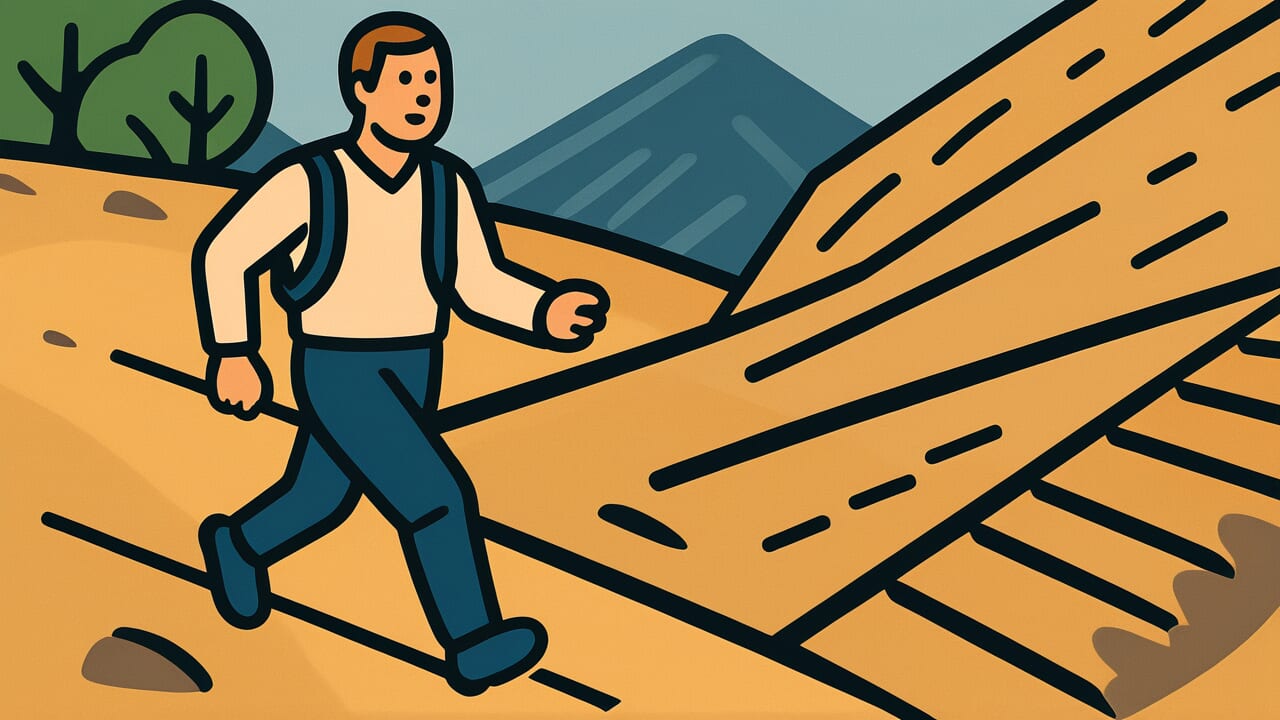How to Read “Going downhill with an injured leg”
Kizu motsu ashi no kudarizaka
Meaning of “Going downhill with an injured leg”
“Going downhill with an injured leg” means that when someone with a weakness or problem faces a dangerous or difficult situation, that weakness makes failure much more likely.
Even challenges you could normally overcome become much harder when you have a weakness. That weakness holds you back and can lead to unexpected failure.
This proverb expresses human vulnerability.
People use it as a warning or lesson when someone tackles important work without proper preparation. It also applies when someone starts a new challenge while dealing with existing problems.
This teaching still applies today in many situations. Taking an important exam while sick is one example.
Starting a new business while in debt is another. Joining a project while having relationship troubles also fits.
Weaknesses might not stand out during peaceful times. But in difficult situations, they can become fatal.
This proverb tells us this harsh truth about life.
Origin and Etymology
No one knows exactly when this proverb first appeared in writing. However, we can learn interesting things by looking at how the words work together.
“An injured leg” refers to a leg with some kind of wound or pain. “Downhill” describes a situation that puts great strain on your legs.
This is much harder than walking on flat ground or uphill.
Anyone who has walked mountain trails knows this well. Going downhill pushes your body weight forward.
Strong impact hits your toes and knees. Even healthy legs get tired easily in this situation.
The proverb combines these two elements to create a clever metaphor. Walking downhill with an injured leg increases pain and raises the risk of falling.
In other words, facing difficulties while carrying a weakness makes that weakness more likely to cause serious failure.
The proverb expresses this lesson by connecting it to physical experience.
Japan has mountainous terrain. People have walked up and down slopes in their daily lives for centuries.
From this lived experience, the relationship between leg condition and slopes naturally became a metaphor for life’s difficulties.
Usage Examples
- He tackled a difficult project without building a solid foundation, and it was truly going downhill with an injured leg—he failed badly
- Facing the big day without taking care of your health is like going downhill with an injured leg
Universal Wisdom
“Going downhill with an injured leg” speaks to a universal truth. Human weakness shows itself most clearly when we face difficulties.
All of us carry some kind of weakness or problem. It might be lack of technical skill.
It might be emotional wounds. It could be financial hardship or troubled relationships.
During peaceful daily life, these weaknesses stay hidden. We manage to get by somehow.
But life always brings times of trial. When that happens, our hidden weaknesses suddenly appear and trip us up.
This proverb has been passed down through generations because humans are fundamentally “imperfect beings.” Everyone carries wounds.
Everyone must walk downhill at some point. We cannot look away from this fact.
Our ancestors faced this harsh reality directly. That is exactly why they taught the importance of preparation and knowing your own weaknesses.
If you have a wound, make an effort to heal it. If you cannot heal it, find the wisdom to choose a different path.
If you see a downhill slope ahead, approach it with careful preparation.
This proverb acknowledges human weakness. But it also gives us wisdom to move forward despite that weakness.
When AI Hears This
Going downhill, gravity continuously accelerates the body forward. The only way to stop is to rely on friction.
But an injured leg cannot press firmly against the ground. This dramatically reduces the friction coefficient.
The accelerating force increases while the braking force decreases. This creates the worst possible combination.
In physics, the friction needed to control movement on a slope increases exponentially as the angle gets steeper. A healthy leg maintains a friction coefficient around 0.6.
But with an injury, it can drop below 0.3. Then even a gentle 15-degree slope reaches the control limit in calculations.
What matters more is this: once sliding begins, the kinetic friction coefficient drops even lower than static friction. Favoring the injured leg creates uneven weight distribution.
One leg starts sliding first, then control is lost in a chain reaction.
This phenomenon also applies to nuclear power plant cooling systems. Heat that causes no problems during normal operation becomes dangerous when cooling function has even a small malfunction.
Rising temperature accelerates deterioration of the control system. This further reduces cooling capacity, creating positive feedback.
When external energy enters a system carrying a weakness, declining control and increasing load happen simultaneously. Time until breakdown becomes far shorter than expected.
This is the essential danger of injury and downhill slopes.
Lessons for Today
This proverb teaches modern people the importance of having courage to face our own weaknesses.
Everyone has weaknesses. You do not need to feel ashamed of them.
What matters is honestly recognizing those weaknesses. Then prepare so they will not become fatal in important situations.
Before taking on big challenges, calmly examine your state of readiness. Are your skills sufficient?
Is your physical condition perfect? Are you mentally prepared?
If you find weaknesses, take time to strengthen them. Do not rush to jump into the downhill slope.
Heal your wounds first, then move forward. This is not cowardice but wise choice.
Or if you cannot do it alone, find companions who can compensate for your weaknesses.
Modern society tends to demand “constant forward progress.” But we also need time to stop and get ourselves in order.
Forcing yourself forward while carrying wounds will ultimately lead to major failure. Then you will suffer even deeper wounds.
On your life’s journey, is now a time for rest or a time to advance? This proverb quietly teaches us the importance of making that judgment.



Comments